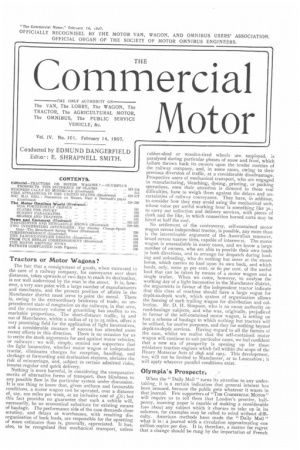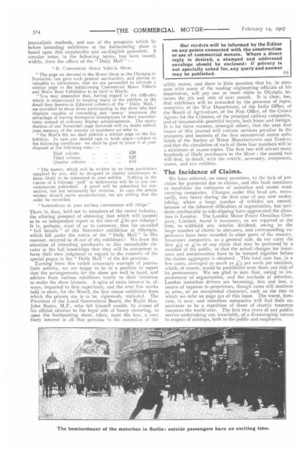Tractors or Motor Wagons ?
Page 1

Page 2

If you've noticed an error in this article please click here to report it so we can fix it.
The fact that a consignment of goods, when entrusted to the care of a railway company, for conveyance over short distances, takes upwards of two days to reach its destination, is not well understood by the man in the street. It is, however, a very sore point with a large number of manufacturers and merchants, and the present position of affairs in the Manchester district must serve to point the moral. There is, owing to the extraordinary briskness of trade, an unprecedented state of congestion on the railways, in that area, and the customary volume of grumbling has swollen to remarkable proportions. The short-distance traffic, in and out of Manchester, within a radius of 15 to 25 miles, offers a very promising field for the application of light locomotives, and a considerable measure of success has attended more recent efforts in this direction. There is no occasion for us to recite the stock arguments for and against motor vehicles, or railways : we will, simply, remind our supporters that the light locomotive, whether motor wagon or independent tractor, eliminates charges for reception, handling, and clerkage at forwarding and destination stations, obviates the risk of miscarriage, and, subject to certain admitted risks, insures regular and quick delivery. Nothing is more harmful, in considering the comparative merits of alternative forms of transport, than blindness to any possible flaw in the particular system under discussion. It is one thing to know that, given uniform and favourable conditions, a motor wagon can be operated, over a distance of, say, zoo miles per week, at an inclusive cost of .4;6; but this fact provides no guarantee that such a vehicle will, necessarily, be an economical substitute for existing means of haulage. The performance side of the case demands close scrutiny, and delays at warehouses, with resulting disorganisation of back loads, are responsible for the upsetting of more estimates than is, generally, appreciated. It has, also, to be recognised that mechanical transport, unless rubber-shod or wooden-tired wheels are employed, is paralysed during particular phases of snow and frost, which failure throws back its owners upon the tender mercies of the railway company, and, in some cases, owing to their previous diversion of traffic, at a considerable disadvantage. Prospective users of mechanical transport, who are engaged in manufacturing, bleaching, dyeing, printing, or packing operations, once their attention is directed to these real difficulties, have to weigh them against the delays and uncertainties of railway conveyance. They have, in addition, to consider how they may avoid using the mechanical unit, whose value per useful working hour is something.like 36., to carry out collection and delivery services, with pieces of cloth and the like, in which connection horsed carts may be hired at half the cost.
No settlement of the controversy, self-contained motor wagon versus independent tractor, is possible, any more than is the interminable argument of the Australian teamster, broad versus narrow tires, capable of interme3t. The motor wagon is unassailable in many cases, and we know a large number of owners, who are able to provide their own loads in both directions, and to arrange for despatch during loading and unloading, who do nothing but sneer at the steam horse, which carries no load upon its own back, and which hauls, only, some 50 per cent. or 6o per cent, of the useful load that can be taken by means of a motor wagon and a single trailer. When we come, however, to analyse the working day of a light locomotive in the Manchester district, the arguments in favour of the independent tractor indicate that this class of machine should have a large vogue for dep6t-to-depot work, which system of organisation allows the horsing of each trailing wagon for distribution and collection. Mr. D. H. Simpson, who is no mean authority on road-haulage subjects, and who was, originally, prejudiced in favour of the self-contained motor wagon, is setting on foot a scheme of haulage in which nothing but tractors will be utilised, for motive purposes, and they for nothing beyond dep6t-to-depot services. Having regard to all the factors of the case, whilst we realise that the self-contained motor wagon will continue to suit particular cases, we feel confident that a new era of prosperity is opening up for those miniature traction engines which fall within the scope of the Heavy Motorcar Acts of 1896 and 1903. This development, too, will not be limited to Manchester, or to Lancashire ; it will apply wherever parallel conditions exist.
Olympia's Prospects.
When the " Daily Mail "turns its attention to any undertaking, it is a certain indication that general interest has been aroused, because the public gets whatever it wants in that journal. Few supporters of "THE COMMERCIAL MOTOR" will require us to tell them that London's premier, halfpenny, morning paper is capable of making a considerable fuss about any sttbiect which it choc.ses to take up in its columns, for examples may be called to mind without difficulty. American methods have made the "Daily Mail" what it is : a journal with a circulation approximating one million copies per day. It is, therefore, a matter for regret that a change should be rung by the importation of French
journalistic methods, and one of the prospects which lie before intending exhibitors at the forthcoming show is based upon this unpalatable and un-English precedent. A circular letter, in the following terms, has been issued, widely, from the offices of the Daily Mail "
"Re Commercial Motor Vehicle Show.
"The page we devoted to the Motor Show at the Olympia in November last gave such general satisfaction, and proved so valuable to advertisers, that we are persuaded to allocate a similar page to the forthcoming Commercial Motor Vehicle and Motor Boat Exhibition to be held in March.
"You may remember that, having regard to the difficulty which is experienced in treating many of the exhibits in the detail they deserve in Editorial columns of the " Daily Mail, ' we conceded to those firms participating in the show who had displays capable of interesting and ` newsy treatment the advantage of having letterpress descriptions of their manufactures instead of ordinary display advertisements. The reproduction of our November page herewith will no doubt refresh your memory of the manner of treatment we refer to. "On March 8th we shall publish a similar page on the Exhibition. In case you should care to book space—subject to the following conditions-we shall be glad to place it at your disposal at the following rates :—
"The matter, which will be written by us from particulars supplied by you, will be de:Agned to convey information to those likely to be interested in your exhibit. Nothing in the nature of a fulsome ` puff' or testimonial will be in any circumstances published. A proof will be submitted for correction, but not necessarily for revision. In case the article written should prove unsatisfactory, we are wining that the order be cancelled.
"Instructions at your earliest convenience will oblige."
There is, thus, held out to members.of the motor industry, the alluring prospect of obtaining that which will purport to be an independent report at the rate of £6o per column ! It is, perhaps, cruel of us to comment, that the so-called " full details " of the November exhibition at Olympia, which fell under the notice of the " Daily Mail " in like manner, referred to IS out of 263 exhibitors ! We draw the attention of intending purchasers to this remarkable circular in the full knowledge that they will be competent to form their own judgment in regard to the contents of the special pages in the " Daily Mail " of the 8th proximo.
Turning from this rather unsavoury example of journalistic activity, we are happy to be in a position to report that the arrangements for the show are well in hand, and advices from various exhibitors testify to their intention to make the show historic. A spice of extra interest is, always, imparted to first experience, and the next few weeks hold in store, for the World, the first motor exhibition from which the private car is to he, rigorously, excluded. The President of the Local Government Board, the Right Hon. John Burns, M.P., who felt himself unable, by reason of his official relation to the legal side of heavy motoring, to open the forthcoming show, takes, none the less, a very lively interest in all that pertains to the extension of thi,
utility motor, and there is little question that he, in common with many of the leading engineering officials of his department, will pay one or more visits to Olympia. between the 7th and 16th of next month. It is clear, too, that exhibitors will be rewarded by the presence of representatives of the War Department, of the India Office, of the Board of Agriculture, of the Post Office, of the Crown Agents for the Colonies, of the principal railway companies, and of innumerable potential buyers, both home and foreign. It is for these reasons, amongst others, that the next four issues of this journal will contain sections peculiar to the prospects and contents of the first commercial motor exhibition of the Society of Motor Manufacturers and Traders, and that the circulation of each of these four numbers will be a minimum of moo° copies. The first two will attract many hundreds of likely purchasers to the Show : the second two will deal, in detail, with the vehicle, accessory, component, stores, and tire exhibits.
The Incidence of Claims.
We have referred, on many occasions, to the lack of provision for payments due to claims,. and this fault continues to invalidate the estimates of motorbus and motor roadcarrying companies. Charges under this head are, necessarily, very heavy during the first year of any new undertaking, where a large number of vehicles are owned, because of the inherent difficulties of organisation, but accidents attributable to side-slipping have aggravated the situation in London. The London Motor Power Omnibus Cornpatty, Limited, found it necessary, as we reported at the time, to withhold any interim dividend, owing to the large number of claims in abeyance, and corresponding experiences have been recorded in other parts of the country. Insurance companies, as a general rule, do not carry the first £5 or ZTO of any claim that may be preferred by a member of the public, so that the actual charges for insurance and compensation have to be lumped together before the claims aggregate is obtained. This total sum has, in a few cases, averaged as much as ,4,3 per week per omnibus, which, of course, would be prohibitive were there any risk of its permanence. We are glad to note that, owing to improvement of organisation, and the methods of selection, London motorbus drivers are becoming, less and less, a source of expense to proprietors, though cases will continue to arise, of an exceptional character, such as the two to which we refer on page 522 of this issue. The worst, however, is over, and motorbus companies will find their experiences to be a repetition of those of electric tramway concerns the world over. The first two years of any publicservice undertaking are, invariably, of a discouraging nature in respect of mishaps, both to the public and employees.
























